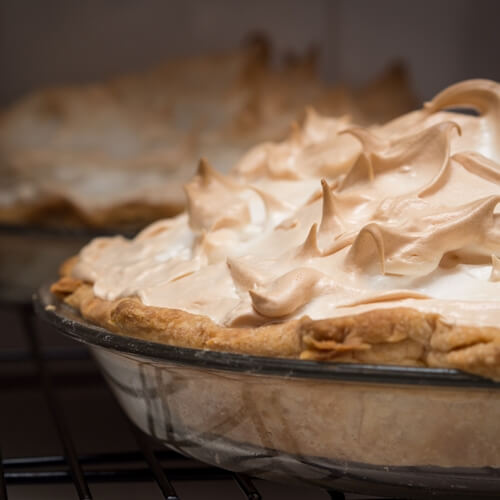Learning The Art Of Meringue
If you’re an avid baker, you know how frequently meringue is used when it comes to whipping up pies and other sweet treats. Meringue is a type of dessert, often associated with Swiss and French cuisine, made from whipped egg whites and sugar that form light, billowy peaks. Sounds simple enough, right? Well, in order to reach those perfect peaks on your cakes, cookies and pies, there’s a certain strategy to which you must adhere.
What is meringue?
This mixture of beaten egg whites and granulated sugar is a bit more in-depth than it appears at first glance. When egg whites are beaten, they can expand up to eight times their original volume. The sugar does not only brings the sweetness factor, it stabilizes the volume and the lightness of the meringue, so it’s important that the sugar be added gradually and slowly. Depending on what you’re making the meringue for, the amount of sugar and methods used can differ. But as a general rule, less sugar creates a softer meringue for toppings on pies or cakes, while more sugar produces a stiffer or harder meringue that is often used for piping into shapes.
Tips for a perfect meringue
Use older eggs: Many meringue recipes work better with eggs that are at least three to four days old. Older egg whites often whip more easily up to a higher volume than thick and fresh egg whites. If volume is more important to you than stability, older eggs are better. For better stability, fresher eggs are OK.
Whip, then add sugar: Never add sugar before whipping the egg whites. Doing so can double the time you have to whip the egg whites to achieve a foam. Instead, add it gradually at the very end when the whites have already created soft peaks. Try using superfine sugar, because it dissolves faster than regular table sugar. Add a few spoonfuls at a time while beating – about 1/4 cup granulated or superfine sugar for each egg white.
Control your consistency: If you’re after soft peaks, place the egg whites in a glass or metal bowl and beat with an electric mixer until whites from peaks with tips that curl over when you stop beating. For stiff peaks, continue beating the egg whites on high speed until they stand straight up when you stop whipping.
Avoid plastic bowls: This is an often overlooked decision when it comes to making meringue. Copper, glass or stainless steel bowls are best for making this sweet treat. Plastic bowls can harbor traces of grease or fat, which prevents the whites from getting stiff.
To add to your repertoire of baking skills, enroll in an online pastry program today.


